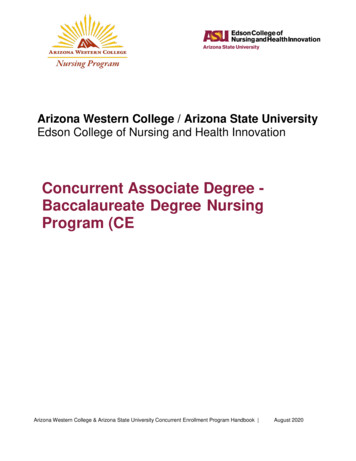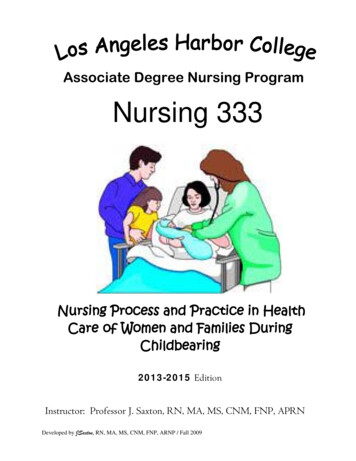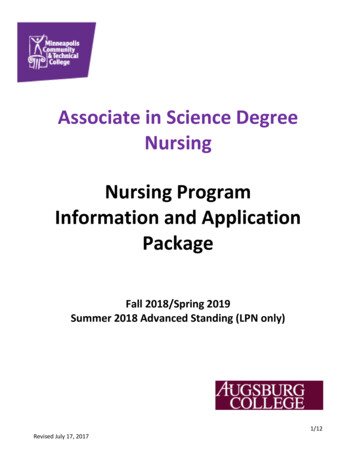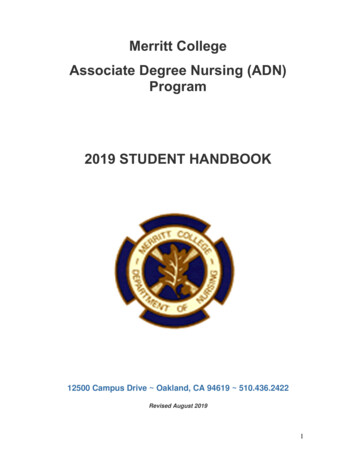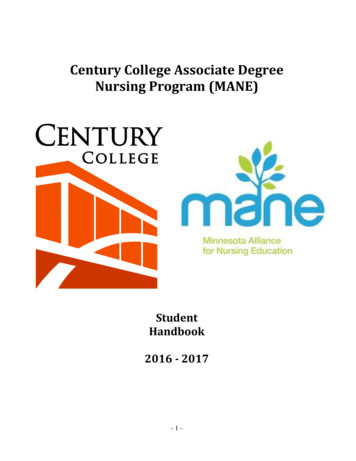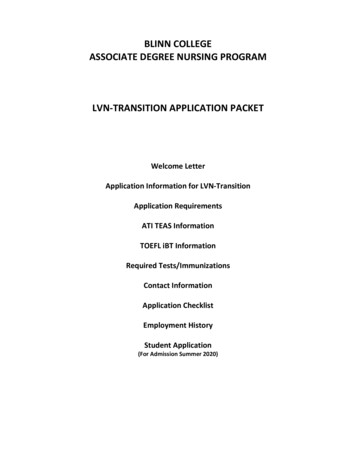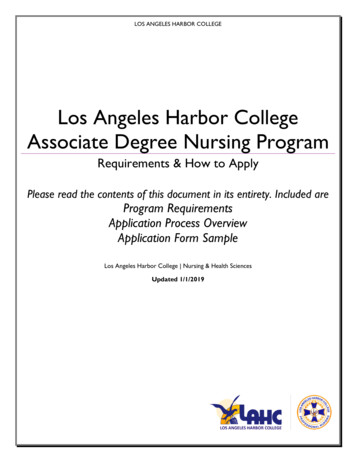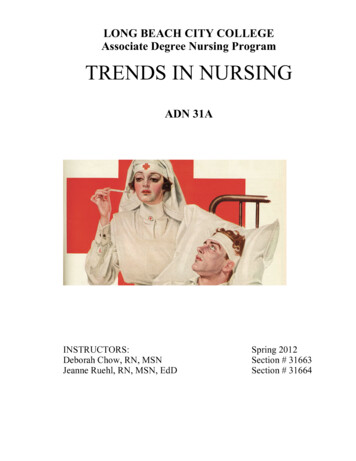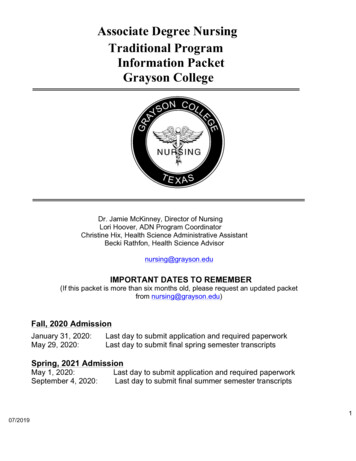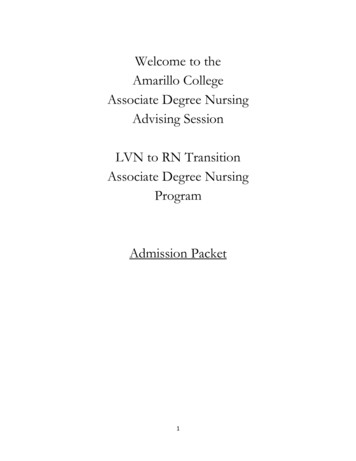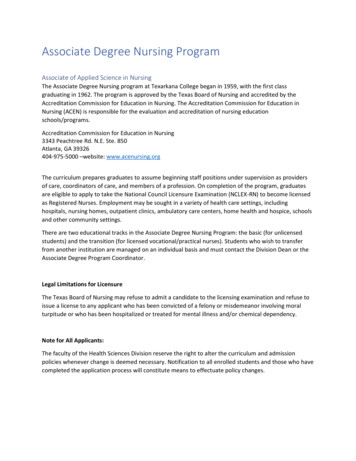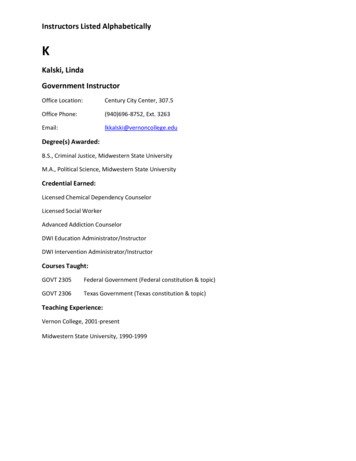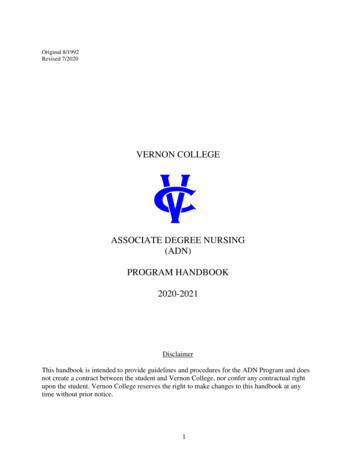
Transcription
Original 8/1992Revised 7/2020VERNON COLLEGEASSOCIATE DEGREE NURSING(ADN)PROGRAM HANDBOOK2020-2021DisclaimerThis handbook is intended to provide guidelines and procedures for the ADN Program and doesnot create a contract between the student and Vernon College, nor confer any contractual rightupon the student. Vernon College reserves the right to make changes to this handbook at anytime without prior notice.1
WelcomeCongratulations on your thoughtful decision to advance your personal and professional development by attendingthe Vernon College ADN Program. I commend you for being selected for admission to the ADN Program and I amdelighted to welcome you. The ADN Program was founded in 1992 after partnering with Amarillo College for twoyears. The ADN program is a very rigorous and challenging program but many students are successful ingraduating and passing the professional licensure examination, NCLEX-RN. You are entering the nursingprofession during a severe nursing shortage in the state of Texas and in the nation. Your opportunities will beendless and your rewards will be great. Your classroom and clinical experiences will prepare you for the everchanging health care environment. Our nursing program is designed to sharpen your critical-thinking skills,stimulate scientific inquiry and develop evidence-based practices within the caring model of nursing.We are very proud of the ADN faculty and staff. The Nursing Faculty recognizes the impact of nursing on thehealth of individuals and their families and the growing demands of a complex health care system. They are acompassionate, educated, and talented group of individuals who are committed to developing and strengtheningyour professional nursing knowledge and skills. Over the course of the next two years, you will have manyquestions. It is important to get these questions answered by a creditable and reliable source. Rumors, second-handinformation and word of mouth may cause undue anxiety. They are eager to help you and want to see you succeed.If you have a question, do not be afraid to speak to your teacher, advisor or me. We have an open door policy andhope that you will use it. All faculty members have posted their office hours on their doors or on their Canvaswebsites. Each faculty member has a college email account and you may contact them by email or by telephone.Please keep those handy, so that you have them when needed.One venue to establish and expand professional nursing interests is through the Student Nurse’ Association. I wouldencourage each of you to consider becoming actively involved in this organization as well as some of the manyactivities/organizations on campus.The information in this handbook is specific to the Nursing Department’s policies and procedures. The ADNProgram Handbook should be used as a supplement to the current Vernon College Student Handbook. You are alsoencouraged to obtain a current Vernon College Student Handbook from the Vernon College website. Thesehandbooks are intended as guides for questions and expectations that you may have concerning performancerequirements and expectations for Vernon College and the ADN Program.Vernon College Administration & Staff:Dr. Dusty Johnston, PresidentJames Nordone, Dean of Student ServicesDr. Elizabeth Crandall, Vice President of Instructional ServicesDr. Mary Rivard, Director of NursingRheasa Onder, ADN Faculty Assistant-Century CityKarla Monson, ADN Faculty Assistant- VernonSabre Sharp, ADN Faculty Assistant-VernonVicki Bradley, Faculty Assistant – VernonADN Faculty:Beth Arnold, MSN, RN, CNS, Assistant Director of NursingJennifer Hatley, MSN, RN, Nursing Simulation and LabCoordinatorRonald Crone, MSN, RN, Assistant Nursing Simulation andLab CoordinatorMary Anderson, MSN, RNSharon Cudjo, MSN, RNJennifer Howard, MSN, RNMelanie Milner, MSN, RNShelli Pendleton, MSN, RNToni Reagan, MSN, RNIn closing, I welcome you to the ADN program at Vernon College. If I can be of assistance to you while you are inthe program, please stop by my office and visit with me. I want to wish the best of luck to each of you in yourendeavors as a nursing student at Vernon College and in your future career as a Registered Nurse. I am confidentyou will share our optimism for the future of professional nursing and the impact that nursing has on the health ofindividuals and societies.Best wishes for a successful and positive nursing education experience at Vernon College,Mary Rivard, PhD, RNC-OBDirector of Nursing2
Table of Contents 2020-2021Welcome . 2Vernon College Mission and Vision Statement . 4Nursing Philosophy & Program Purpose. 5Program Objectives & Outcomes . 6Concept of Holism . 7Conceptual Framework . 7Curriculum & Major Curriculum Concepts Symbols . 9Student Policies, General Information: Medication Dosage Calculation Testing, Nursing Pathophysiology. 10Failure/Withdrawal from ADN Courses, Re-admission & Re-entry Requirements . 12Transfer Students . 14Drug & Alcohol Use Policies, CPR Certification, Physical Examination. 15Requirements for Graduation, & Capstone Experience (HESI exit exam) . 16Standards of Progress, Grading System, and Testing Policy . 17Testing Accommodations, Clinical Grading System, Nursing Assignments, Interrater Reliability Policy . 18Clinical/Professional Incompetency, Voluntary Tutoring, Scholastic Requirements, Religious Day Absence, & NursingDepartment Attendance Policy . 19Record of Attendance, Clinical Absence Policy . 20Administrative Withdrawals, & Student Initiated Drops/Withdrawals, Disciplinary Policies, BON Disciplinary Policy, VernonCollege Disciplinary Policy, & Vernon College Student Civility Policy . 21Netiquette for Nursing Students. 23Demerit System & Dress Code . 26Professional Behavior . 28Dismissal/Administrative Withdrawal from the ADN Program, Tobacco Policy . 29Guidelines for Resolving Problems, Due Process/Student Grievance Procedure . 31ADN Student Association (SNA) & Critical Thinking . 32Tips for Classroom Note-taking . 33Acknowledgment of Risks Policy & Department of Health & Human Services/CDC Standard Precautions. 34Simulated Lab (SIMS) . 40Clinical Policies . 41United Regional Parking Student Requirements & United Regional Parking Map . 42Policies for Nursing Students in all Clinical Agencies . 47Texas Board of Nursing (BON) Eligibility Questions . 51Declaratory Order & Texas Nursing Jurisprudence Exam . 52Appendices . 53Student Advisement Form . 56Tl/Demerit Cheat Sheet . 55Nursing Student Handbook Acknowledgement . 58Exam Remediation Policy. 60Clinical Remediation Policy . 623
Vernon College Mission StatementThe mission of Vernon College is teaching, learning, and leading. Vernon College is a comprehensive communitycollege that integrates education with opportunity through our instructional programs and student support services bymeans of traditional and distance learning modes. Therefore, to fulfill its mission, the College will provide access,within its available resources, to Career technical/workforce programs up to two years in length leading to associatedegrees or certificates; Career technical/workforce programs up to two years in length, leading to associate degrees or certificates; Career technical/workforce programs leading directly to employment in semi-skilled and skilled occupations; Freshman and sophomore courses in arts and sciences, including the new core and field of study curriculaleading to associate and baccalaureate degrees; Ongoing adult education programs for occupational upgrading or personal enrichment; Compensatory education programs designed to fulfill the commitment of an admissions policy allowing theenrollment of disadvantaged students; A continuing program of counseling and guidance designed to assist students in achieving their individualeducational goals; Career technical/workforce development programs designed to meet local and statewide needs; Support services for educational programs and college-related activities; Adult literacy and other basic skills programs for adults; and Such other programs as may be prescribed by the Texas Higher Education Coordinating Board or localgoverning boards in the best interest of postsecondary education in Texas.Approved by College Effectiveness Committee September 12, 2014Officially approved and adopted by the Board of Trustees on October 15, 2014Mission as adapted from the Texas Higher Education Coordinating Board Strategic Plan for Texas Public CommunityColleges 2011-2015, according the Texas Education Code, Sec. 130.003(e)Vernon College Vision StatementVernon College will promote a culture of success for our students and communities through learner-centered qualityinstructional programs and exemplary services.4
Nursing Philosophy and Program PurposeTHE ADN PROGRAM AT VERNON COLLEGE IS A SPECIALIZED PROGRAM AND IS IN ALLIANCEWITH THE MISSION AND PURPOSE OF VERNON COLLEGE. THE PROGRAM REFLECTS THE ROLEAND MISSION OF THE COLLEGE BY RESPONDING TO THE NEEDS AND ASPIRATIONS OF THECOMMUNITY IT SERVES. BY ITS COMMITMENT TO ACCESSIBILITY, COMPREHENSIVENESS,FLEXIBILITY, QUALITY, AND ACCOUNTABILITY, THE ADN PROGRAM STRIVES TO OFFER ACOMPREHENSIVE BASIC NURSING CURRICULUM WHICH MEETS THE NEEDS OF INDIVIDUALS ANDAGENCIES IN OUR COLLEGE SERVICE AREA. THE ASSOCIATE NURSING DEGREE PROGRAM WILLPROVIDE AN AVENUE FOR ARTICULATION AND UPWARD MOBILITY IN NURSING EDUCATION. ITIS THE PURPOSE OF THE ADN PROGRAM TO PROMOTE EXCELLENCE IN PROFESSIONAL NURSINGAND PROVIDE ASSISTANCE IN SUPPLYING NORTH CENTRAL TEXAS WITH QUALIFIED GRADUATENURSES WHO ARE ELIGIBLE TO TAKE THE NCLEX TO BECOME REGISTERED NURSES.The faculty believes that a person is: a bio-psychosocial being that forms an open, unified system that seeksequilibrium within the environment by the process of adaptation.Nursing is a process-oriented profession which: focuses on the person's status along the health-illness continuumand utilizes the body of knowledge derived from the behavioral, social, and natural sciences. The goal of nursing isto promote individual or group adaptation by the use of the nursing process to assist the person to achieve selfdetermined health goals and maintain or improve levels of functioning along the health-illness continuum. The goalof adaptation is supported through nursing assessment and intervention, with the person serving as an activeparticipant. A unique aspect of nursing is its concern with the humanistic and holistic approach to client care.Nursing intervention is carried out within the context of the nursing process to maintain, restore, or promoteadaptation of individuals or groups.Environment is: all of the external conditions and influences that affect the development of the person includinginternal and external stressors. Adaption is both a process of coping with stressors and an end state produced by theprocess. When coping mechanisms are effective in dealing with stress, a dynamic state of equilibrium results thatfosters the goals of the person. When unusual stresses or weakened coping mechanisms make the person's usualattempts to cope ineffective, then nursing intervention is needed.Health is: a state-adaptation resulting from successful coping with stressors; as a process-responding positively toenvironmental changes. On a health-illness continuum, health can be viewed from death through extremely poorhealth, poor health, normal health, good health, and high-level wellness to peak wellness.Education is: necessary for the maintenance and improvement of a democratic society and that education helpsequalize opportunity for all people. In support of the College purpose, the Nursing Department recognizes thatcertain values should be assimilated by students. These values should include the acquisition and application ofdecision-making skills to daily situations, a commitment to life-long learning, an effective use of leisure time, thedevelopment of independent (critical) thinking, and an understanding of societies and cultures.Nursing Education: The foundation of the associate degree nursing education is derived from theoretical conceptsand principles from the behavioral, natural, and social sciences. Hence, the faculty is committed to the studentcompleting the core curriculum courses, as outlined by the College, and thus demonstrating academic qualificationsprior to entering the program. Nursing education is a sequential process, utilizing previously acquired knowledge,skills, and attitudes to facilitate continued behavioral change. Terminal and course objectives reflect the expectedprogression of the student in areas related to identify curriculum threads. Previously-acquired knowledge and skillsare recognized in the L.V.N. student and facilitated by the LVN Transition program as an option of enrollment.Learning involves cognitive, affective, and psychomotor components. Students participate in a variety of learningactivities to support evidence based practice including classroom lectures, simulated laboratory experiences,computer-assisted instruction, interactive video instruction, clinical practicums, and seminar classes. Course andterminal objectives are designed to evaluate the student in all three educational domains.5
Nursing Education Continued: The faculty believes that a learning situation involves problem-solvingexperiences and that learning is the organization of parts into a meaningful whole. The faculty accepts the followingprinciples of learning:1)Learning is influenced by inherent potential, past experiences, attitudes, and values of eachstudent.2)Learning is more effective in an atmosphere of mutual respect and trust.3)Learning is more effective when the learner is actively involved.4)Learning is more effective when the learner accepts the major responsibility for his/her learning.5)Learning is strengthened by the reinforcement of satisfying learning experiences.The faculty accepts the responsibility of: guiding the student through the educational process whereby he/she canacquire the ability to identify and utilize concepts, theories, and scientific principles to initiate the nursing process.To meet this goal, the curriculum incorporates the following concepts: a person is a holistic being-an open systemin continuous interaction with the environment, the life process, basic human needs, health-illness continuum,adaptation, homeostasis, communication, functional health and response patterns, and the nursing process. Tostrengthen this belief, the faculty utilizes strategies which foster commitment, accountability, decision-making, selfawareness, and the desire for continued self-enrichment in the student.Program Objectives/Outcomes:The Vernon College ADN Program Outcomes are based on the NCLEX-RN test requirements for licensure as acapstone requirement for the ADN Program.The 4 NCLEX-RN Client Needs and Sub-categories:1. Safe and Effective Care EnvironmentManagement of CareSafety and Infection Control2. Health Promotion and Maintenance3. Psychosocial Integrity4. Physiological IntegrityBasic Care and ComfortPharmacological TherapiesReduction of Risk PotentialPhysiological AdaptationProgram Outcomes:1. Create a Safe and Effective Care Environment - promotes achievement of client outcomes by providingand directing evidence-based nursing care that enhances the health care delivery setting in order to protectclients and health care personnel. Implement Effective Management of Care Techniques – employs
comprehensive basic nursing curriculum which meets the needs of individuals and agencies in our college service area. the associate nursing degree program will provide an avenue for articulation and upward mobility in nursing education. it is the purpose of the adn program to promote excellence in professional nursing
